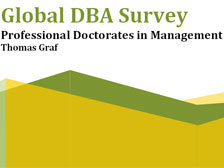The Cranfield School of Management offers an Executive DBA which is considered by many as one of the best Doctorates of Business Administration in the world. We asked Professor Emma Parry, Director of Doctoral Programmes (Leadership and Management) at Cranfield University, what a world class DBA looks like.
1. What does a world class DBA look like?
A world class DBA should have a number of features. First, it should truly be differentiated from a PhD – there are a few programmes out there that are very similar to a PhD in structure and style but marketed at the executive market. While a DBA is a doctorate so should be of equivalent standard to a PhD, the focus should be clearly on creating practice-relevant research that has an impact on practice or policy and is useful to those who want to stay in a primarily practice based career. This is opposed to a PhD which is aimed at those who want to make a full-time transition into academia, and therefore should have a focus on building theory. Second, a good DBA should provide sufficient support and structure (usually via teaching, supervision and regular progress reviews) for students to progress through the programme successfully and thus complete on time. Third, a good DBA should consider not only the research and construction of the thesis, but also the personal development of the student into an individual who has a rigorous and evidence-based approach to their work and therefore can take a step up in their career to one which requires a higher level of decision-making.
2. Who is the ideal Cranfield DBA student?
I am not sure that there is such a thing – our cohorts of DBA students are very diverse, with students from a wide variety of backgrounds, nationalities and with a range of different experiences. However, we do have quite high standards in relation to the DBA students that we recruit. Most of our DBA students have more than ten years experience in their practical field and thus have a high level of practical expertise in their area of interest. We look for individuals who have the potential for the critical thinking that is needed for doctoral level study and a real passion for their topic.
3. How close does the Cranfield programme come to your definition of a world class DBA?
Very close. We have worked very hard at Cranfield to develop a DBA programme that we believe is one of the best in the world. We regularly review the programme and the feedback from our students so that we can look at ways of improving it further. My role as President of the Executive DBA Council enables me to benchmark the Cranfield Executive DBA against others and to identify elements of good practice. We re-designed our programme in 2013 to ensure that the focus was well and truly on practical impact. Students are encouraged to engage with the end users of their research throughout the programme so that they end up with something that they can exploit afterwards whether within their organisation or as part of a consultancy offering. We also added more structure into the programme – students now complete their thesis in smaller building blocks, which is more achievable – and added additional layers of support. These changes mean that a higher proportion of students are successfully completing the DBA within the four-year period – and some even sooner – as well as undergoing a significant personal transition. These characteristics, alongside becoming a member of a very diverse cohort of senior practitioners, and working alongside our excellent faculty, means that the Cranfield DBA really is outstanding.
4. How did your DBAs profit from the programme afterwards?
Our DBA alumni benefit from their DBA in a number of ways - there is no one path after completing the DBA. Some take the step up within their organisation, often to Board level, while others develop consultancy businesses based upon their DBA research and have been very successful. Others have gone into government or more political roles or have chosen to adopt more portfolio careers combining some academic work such as lecturing with consultancy. We recently undertook some research asking our alumni about the impact of the programme – notably they all talked about the transition that they made in their thinking and their approach to work and the significant impact that this has had on their careers. It is worth noting that the employers of our students often also benefit from their DBA – they gain some in-depth research at a fraction of the cost of similar consultancy, as well as a motivated employee who is capable of operating at the highest level.





